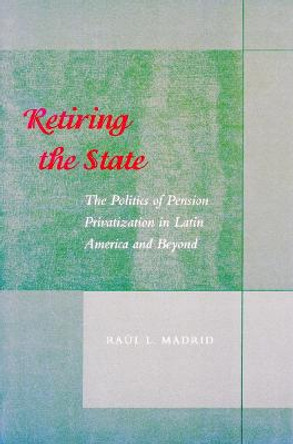Description
Explores why indigenous movements have recently won elections for the first time in the history of Latin America.
About the Author
Raul L. Madrid is Associate Professor in the Department of Government at the University of Texas, Austin. He is the author of Retiring the State: The Politics of Pension Privatization in Latin America and Beyond (2003) and is a co-editor of Leftist Governments in Latin America: Successes and Shortcomings (Cambridge University Press, 2010). His articles have appeared in Comparative Politics, Electoral Studies, Journal of Latin American Studies, Latin American Politics and Society, Latin American Research Review, Political Science Quarterly and World Politics.
Reviews
'This is a well-executed and timely book. Madrid offers a novel theory about the success of ethnic parties under conditions of ethnic fluidity and intra-ethnic group fragmentation. Empirically, the author impressively triangulates qualitative and quantitative evidence from in-depth country studies to illustrate his story. The book contributes both to the general theoretical literature about the success of ethnic parties and the literature specifically focusing on Latin America. The policy implications drawn out in the last chapter and, to a lesser degree, in the substantive chapters are interesting and thought provoking. This book is an excellent read for anyone interested in ethnic politics in Latin America and beyond.' Johanna K. Birnir, University of Maryland
'In this thoroughly researched and well-crafted book, Raul Madrid upends existing explanations for the rise and success of indigenous parties in Latin America while also challenging the broader scholarship on ethnic politics. Madrid convincingly shows that neither institutional change nor social movements are the primary drivers behind the success of indigenous parties; what matters most is a strategy of inclusive populism.' Christina Ewig, University of Wisconsin, Madison
'The Rise of Ethnic Politics in Latin America makes a major contribution to the study of ethnic politics. Madrid reconceptualizes ethnic mobilization in a way that takes seriously the mixed and fluid character of ethnic identities in Latin America, and he shows that ethnic parties only succeed in the region when they make inclusive appeals that go beyond ethnicity. Moreover, the book offers the most sophisticated analysis I have seen of the impact of ethno-populist movements on democracy in Latin America. Madrid's book helps us understand the distinct character of ethnic politics in Latin America, but I suspect it will travel beyond Latin America. I recommend it not only to students of Latin American politics, but to anyone interested in ethnic politics.' Steven Levitsky, Harvard University
Book Information
ISBN 9780521153256
Author Raul L. Madrid
Format Paperback
Page Count 256
Imprint Cambridge University Press
Publisher Cambridge University Press
Weight(grams) 360g
Dimensions(mm) 234mm * 155mm * 15mm








